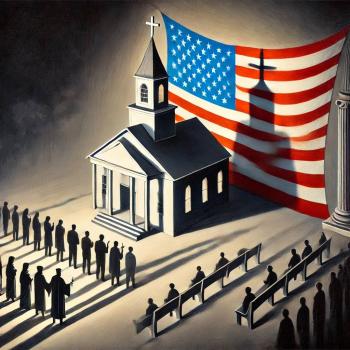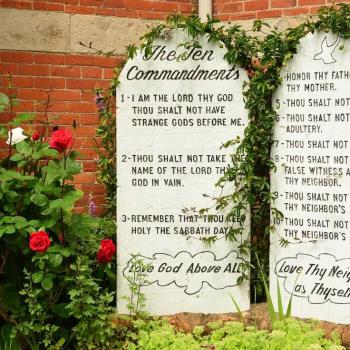
“White Christian nationalism is built upon a fundamental lie,” the Rev. Stephen D. Jones wrote in an article that ran in the Kansas City Star and several other newspapers earlier this week. The lie is “that America was founded by Christians for Christians.” And the long-time pastor determined to unveil the lies behind Christian nationalism.
Jones accuses white Christian nationalist leaders of trying to convince Americans “that Christianity, particularly their version of Christianity, should have elevated status and indeed dominate every facet of our society.”
But there’s more. Jones, who has been a Baptist minister for 52 years, says that in addition to the lies behind Christian nationalism are beliefs that violate Christ’s teachings.
The pastor’s charges are extraordinary:
- A significant minority in America’s Christian church is lying to Americans about one of the most important rights we have — religious freedom.
- Not only that, but the minority is trying to “dominate every facet of our society.”
- And even worse, this so-called “Christian” faction violates Christ’s teachings.
Jones is right on every count. (You may read my thoughts on Christian nationalism below.)
- “Christian Nationalism & Its Threats to Religious Freedom“
- “Preserving Our Religious Freedom in America”
- “Did Our Earliest Presidents Let Personal Religious Beliefs Influence Their Decisions?”
The Fundamental Lie
The fundamental lie, according to Jones, is that Christians established the U.S. for Christians. That is, Christian founders established the nation as a Christian nation.
The truth is that America was founded on religious freedom. Every citizen has the right to worship as he or she chooses or to refrain from worshipping at all.
There is no language in the U.S. Constitution that compels any citizen to become a Christian or to follow any religion. The First Amendment to the Constitution is quite clear:
Congress shall make no law respecting an establishment of religion or prohibiting the free exercise thereof….
“It is true that most of America’s founders were Christian, though there were significant exceptions,” the Rev. Jones wrote. “But they came to America in large part seeking religious liberty not Christian domination.”
Many of these religious refugees were fleeing countries that had state religions. Surprisingly, nine of America’s original 13 colonies had state-supported churches at first, but within 15 years, “nearly all state churches in the colonies ended and religious liberty in America began,” Jones said.
“Yet today, there is a growing group of people – once on the fringe, but now in elected offices across American government – who seek Christian domination,” the pastor noted.
“They want their version of Christianity to be given preferred treatment. Even U.S. House Speaker Mike Johnson has a Christian nationalist flag hanging at the entrance to his Capitol office.”
But Mike Johnson’s version of Christianity is definitely not my cup of tea, and it may not be yours, either. So, let’s give preferred treatment to Ginny Baxter’s version of Christianity… or Rev. Jones’ version… or yours.
What Did Our Founders Believe?
The founding fathers were Protestant for the most part. They were church members for the most part and referred to God in public statements, but – and it’s a huge “but”….
- America’s founding fathers were not born-again Christians.
- They were not evangelicals as 21st-century Americans define the word.
- Many, if not most, did not believe in a personal God.
- Many did not accept Christ’s divinity.
- Most were religious rationalists.
- Most opposed state religions, although Patrick Henry may have toyed with the idea.
Their beliefs would hardly be acceptable in today’s right-wing conservative circles.
Our Founding Fathers & Deism
America’s founding fathers didn’t advertise their private beliefs about religion, but many were Deists.
“…Deism originated in England in the early 17th century as a rejection of orthodox Christianity,” Britannica explained. “Deists asserted that reason could find evidence of God in nature and that God had created the world and then left it to operate under the natural laws he had devised.”
“If the founders were dogmatic about anything, it was the belief that a person’s faith should not be intruded upon by government and that religious doctrine should not be written into government,” said the Center for American Progress, which describes itself as an independent, nonpartisan policy institute.
“Deists argued that human experience and rationality – rather than religious dogma and mystery – determine the validity of human beliefs,” according to Britannica.
“Persons influenced by the movement had little reason to read the Bible, to pray, to attend church, or to participate in such rites as baptism, Holy Communion, and the laying on of hands by bishops.”
Future U.S. presidents George Washington, Thomas Jefferson and James Madison were Deists, as were Benjamin Franklin, Alexander Hamilton, Thomas Paine and Ethan Allen.
Patrick Henry and John Adams were solidly Christian, while founding father James Monroe was probably a Deist, but actually said little about his religious beliefs.
These are the truths that Americans should know about their founding fathers, rather than the lies behind Christian nationalism.
Words & Deeds
- George Washington: “The government of the United States is not in any sense founded on the Christian religion.” America’s first president was a church member but refused to take communion as an adult. Consequently, he was considered to be a Deist by people who knew him.
- Thomas Jefferson: Jefferson once told a close friend, “I am not a real Christian, that is to say, a disciple of the doctrines of Jesus,” according to several sources including PBS. Jefferson saw Christ as a wise teacher, rather than the son of God. He rejected Jesus’ virgin birth, resurrection and divinity and was arrogant enough to create his own version of the New Testament, which is known as the Jefferson Bible. A few years before his death, Jefferson used a razor to cut passages from six copies of the New Testament. He rearranged and pasted the scraps together to create his own version of the New Testament, which omits all references to miracles and Christ’s divinity and portrays Jesus as “a Teacher of Common Sense.” The 86-page Jefferson Bible is part of the Smithsonian’s National Museum of American History collection.
- Benjamin Franklin: Franklin denied “that the Almighty ever did communicate anything to man, by… speech… language, or …vision.”
- James Madison: Madison strongly opposed government interference in religion, even writing a document that included 15 reasons why the government should not support any religion. He also objected to chaplains opening congressional proceedings with prayer.
- James Monroe: Monroe was officially an Episcopalian, but probably was a non-Christian Deist in reality.
- Thomas Paine: Paine called Christianity “a fable” and made this profession of faith: “I believe in one God, and no more.” He generally referred to God as “the Creator” or “the Ruler of Great Events.”
- Ethan Allen: Allen was apparently a non-Christian and a Deist.
- John Adams: Adams was one of the few founding fathers who was a devout Christian.
Following is an excerpt about the founding fathers’ religious beliefs from The Master’s University, which says a number of the founding fathers were theistic rationalists.
“Theistic rationalists believed in a powerful, rational, and benevolent creator God who was present and active in human affairs….”
However, they “rejected most of the fundamental doctrines of biblical Christianity, including:
- The deity of Christ
- The Trinity
- Original sin
- The atoning work of Christ
- Justification by faith
- Eternal punishment for sin
- Inspiration of Scripture.”
How are these beliefs Christian?
They aren’t, but Christian nationalists don’t seem bothered by the truth. They simply rewrite American history and sell it to Americans who don’t know their nation’s past. The Germans once bought a lie about being members of a superior race called the Aryans, and they followed their leaders like lemmings who went over a cliff and into the sea.
If enough Americans believe the lies behind Christian nationalism, we may suffer the same fate.
Domination, Control & Coercion
But let’s return to the Rev. Jones and his charges against Christian nationalism. “It may seem surprising that I am a leader of an effort in Kansas City during this election year to resist white Christian nationalism,” he said in his guest column.
One of his reasons for rejecting the movement is this fact: “White Christian nationalism does not invite people into the faith, but rather seeks to dominate, control and coerce not only individuals, but society.”
Texas state Rep. James Talarico also took aim at Christian nationalism this past week. In a news conference at the state capitol, he said, “There is nothing Christian about Christian nationalism. It is the worship of power – political power, social power, economic power – in the name of Christ. And it is a betrayal of Jesus of Nazareth.
“Three years ago, Christian nationalists stormed the U.S. Capitol, killing police officers while carrying crosses and signs reading ‘Jesus Saves,’” Talarico said. “Two years ago, Christian nationalists on the Supreme Court overturned Roe v Wade, allowing states like ours to outlaw abortion, even in cases of rape and incest.”
He pointed out that Jesus asked us to love our neighbors – “not just our straight neighbors. Not just our male neighbors, not just our white neighbors, or our rich neighbors. We are called to love all our neighbors.”
The Rev. Dr. Paul Baxley, executive coordinator for the Cooperative Baptist Fellowship, has said that “to suggest that the church needs the protection of the state in order to flourish and thrive is idolatrous.”
He cites the parting of the Red Sea and the raising of Jesus from the dead as examples of God’s awesome power. With powers such as those, the Almighty certainly doesn’t need any help from humans.
Violating Christ’s Teachings
The Rev. Stephen D. Jones made one additional charge in his column on Christian nationalism. That is, Christian nationalism violates Christ’s teachings.
How so?
“I take exception to white Christian nationalism because it is a complete misrepresentation of Jesus of Nazareth. He didn’t seek to dominate, coerce or control others. Not ever.
“And he didn’t seek preferential treatment for his followers or himself. His teachings were just the opposite. Jesus taught that ‘those who want to be first among you must be your servant,’ as in Matthew 20:27.”
“As a follower of Jesus,” Jones continued, “I don’t want to be a part of any group that coerces, dominates or seeks to control our society. I don’t want to be a part of any system that seeks preferential treatment of white people. I don’t seek preferential treatment of Christians.
“I choose to live in freedom where everyone is granted equal rights and opportunity, regardless of race, gender, age, economic status or orientation.”
Jones added that some forms of Christian nationalism have existed in the U.S. for many years. At one point, it was known as the Ku Klux Klan, and it has “become more pervasive and masks itself behind lies and misrepresentations.”
My Musings
Lauren Boebert (R-CO) explained something quite well – a first for her — when she talked about Christian nationalism’s philosophy at a political rally in 2022: “The church is supposed to direct the government,” she said. “The government is not supposed to direct the church. That is not how our Founding Fathers intended it.”
What part of the following statement does she not understand? Congress shall make no law respecting an establishment of religion or prohibiting the free exercise thereof….
And what part of “separation of church and state” escapes her understanding?
Heaven help America.













